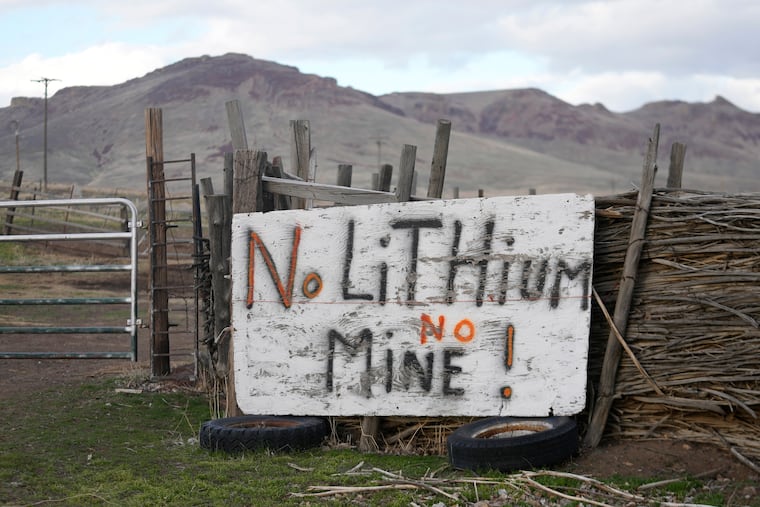Federal mining law needs an update | Editorial
A mining law that was relevant when prospectors were looking for silver and gold in “them thar hills” fails to address today’s realities.

Bipartisanship in Congress isn’t dead, but it shows up too infrequently, like two years ago when the Infrastructure Investment Act was passed. That spending law touches almost every aspect of American life by providing long-needed federal money to rebuild roads, bridges, and rails, expand access to clean drinking water, and bring high-speed internet to rural and other deprived areas.
Less visibly, feuding Republicans and Democrats often agree on issues they may want to get less public attention. Sometimes that’s because rather than fulfilling their constitutional duty to promote the nation’s general welfare, they are helping the politically active corporations that fund their election campaigns and provide jobs in their home states.
The super slim majorities in Congress in recent years have made that brand of bipartisanship much easier. You need only a handful of folks from the other team to change sides to win a game. That appears to be happening now as the Senate considers legislation already passed by the House that would further weaken this country’s practically irrelevant 1872 mining law.
» READ MORE: Congress needs to get serious about AI oversight | Editorial
Nine Democrats helped to pass the House bill, including cosponsor Mary Peltola of Alaska, who represents one of the Western mining states most affected by the ruling. They want to neuter a 2022 Ninth Circuit U.S. Court of Appeals ruling that said the U.S. Forest Service violated the nation’s 152-year-old mining law by allowing Rosemont Copper Co. to dump mining waste on federal land in Arizona’s Santa Rita mountains without first obtaining a valid mineral claim.
The mining law prohibits the federal Bureau of Land Management from issuing a claim until a mineral deposit has actually been found. Consequently, the court ruled that without a claim, Rosemont must stop dumping rocks and running power lines on nearby federal land where its miners are not looking for the zinc, manganese, and lithium needed to make electric car batteries.
Democrat Catherine Cortez Masto of Nevada and Republican Jim Risch of Idaho are cosponsors of the Senate version of the bill that would allow mining companies without claims to nevertheless keep dumping waste on nearby federal land. Some of these grounds are considered sacred by Native American tribes. “My legislation will undo the damage of the misguided Rosemont decision and protect thousands of jobs across the West,” Cortez Masto said.
Begging to differ, Democratic Rep. Melanie Stansbury of New Mexico said the proposed law will open the door to disaster. “Under this bill, any American — or frankly any American subsidiary of a foreign company, including those that are located in adversarial countries — can put four stakes in the ground and on open public lands pay less than $10 an acre per year to have exclusive rights to that land forever,” Stansbury said.
The Biden administration might have been tempted to side with the miners, given its commitment to the clean energy technology that requires the minerals involved. But the White House instead pointed out that the bipartisan bill opens the door for mining companies to thwart competition by obtaining claims before finding any minerals by simply paying the nominal fee required under the outdated mining law.
The administration also cited a U.S. Department of the Interior opinion issued after the Rosemont ruling that said even when a claim has been issued, it should not be used to conduct ancillary activities on land miners don’t plan to mine. The opinion said dumping rock waste, for example, could result in the “permanent occupation of federal lands” and “foreclose” any future possibility of the “profitable extraction of minerals” from them.
That likely means very little to conservative members of Congress and judges who, rather than listen to federal agencies, seem more intent on undermining what they call the “deep state.”
» READ MORE: Pa. lawmakers must join other states in fighting the rise of exorbitant hospital ‘facility fees’ | Editorial
Like so many other issues, this one requires more than a Band-Aid solution. The overarching problem is a 152-year-old mining law that was relevant when prospectors were looking for silver and gold in “them thar hills” but fails to address today’s realities.
It’s past time to replace that archaic document, but that won’t happen without broader bipartisanship than the coalition of Republicans and Democrats who in their hearts know their effort to gut the Rosemont ruling is like looking at trees without seeing a forest. They are trying to prop up an outdated system to help the mining companies that help them win reelection by boosting their states’ economies.
Maybe that’s why 248 years later, some still refer to the American system of democracy as an “experiment.” We still haven’t mastered how to use it as effectively as it should be. People elected to Congress still tend to put their states or regions above the good of the nation as a whole.
Thomas Jefferson worried about that; it’s still a worry now. Can we at least find enough unity to update our enfeebled mining law?